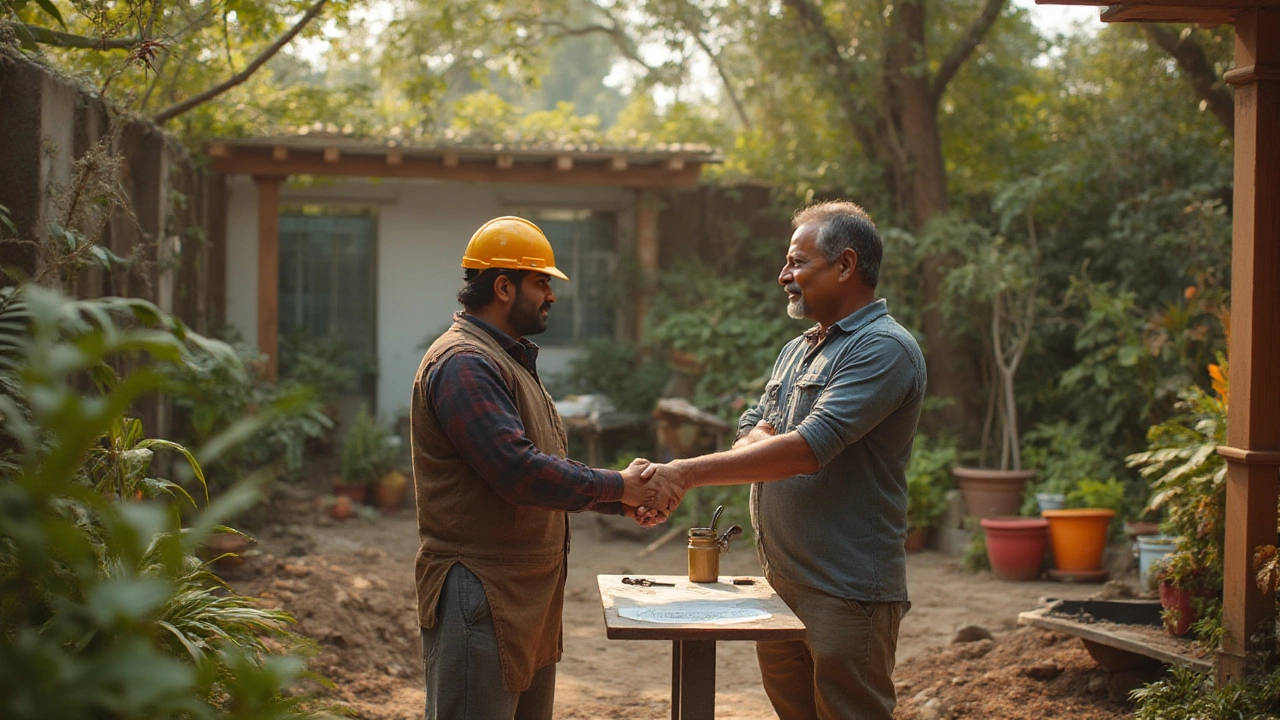How to Negotiate with a Landscaper: Tips for Lowering Your Landscaping Costs

Had enough of your garden looking like an overgrown jungle, but sweating at the thought of talking money with landscapers? You’re not alone. Negotiating with tradespeople comes with that awkward tingle ― you want a fair deal, they want to get paid, and everyone’s wondering who’s bluffing. What most homeowners don’t realise, though, is how much wiggle room there is when it comes to landscaping jobs. Knowing what to say, what to avoid, and where to dig in your heels can turn ‘extra costs’ into actual savings, and make the experience a lot less painful.
Understanding the True Cost of Landscaping
Landscaping isn’t just about picking out plants or tossing down turf. There’s a web of factors that make up your quote. The average cost for landscaping in the UK floats between £5,000 and £25,000 for a medium-sized garden, according to checkatrade.com in March 2024. That huge range comes down to the size of your plot, complexity of design, quality of materials, and the skills (plus reputation) of your landscaper. Some jobs get quoted by the metre, others by the job. Want a patio? That’ll run you anywhere from £70–£120 per square metre, depending on whether you fancy porcelain tiles or good ol’ concrete slabs. If you’re leveling the lawn, that’s less cash but more grunt work. Hardscaping — things like retaining walls or bespoke lighting — stacks up quickly.
Many landscapers charge for labour by the day. In Manchester, garden labourers cost an average of £150–£250 per day (as of May 2025). Throw in machine hire, skip costs, and design fees, and your bill grows before you’ve chosen your first plant. Then there's VAT, which too many homeowners forget — if your contractor is VAT-registered, you'll be paying an extra 20% on top unless their prices are listed as 'VAT inclusive'. For big projects, designers might set their own fee separate from actual installation, so don’t be shocked when you see this added alongside supplies and labour.
What eats up most of the budget? People tend to underestimate groundwork (like clearing, leveling, and waste), and high-spec paving can get eye-watering quickly — up to £160 per m2 if you want something seriously flash. Swapping to simpler stones, slimmer borders, or focusing on fewer, larger plants (rather than hundreds of small ones) can lower the cost dramatically. Not all landscapers pass on their trade discounts to you, but it never hurts to ask. Some will mark up materials 10-30%; negotiate this if you're comfortable checking prices at local suppliers yourself.
How to Get Competing Quotes and Spot the Details
Most people only ask one landscaper for a quote, either out of politeness or sheer exhaustion. You need at least three, from companies with strong local reputations. Check online reviews, but ask neighbours who they’ve used. It’s pretty common for prices to differ by 20–30% between quotes for the same job, even if labour rates are about equal. The reasons? Materials, timescales, and scope creep. One landscaper might slip in hauling extra soil, while another quotes it as ‘to be agreed’. Always request a breakdown: materials, labour, disposal, design, and VAT. If they give you a lump sum with zero details, push for more clarity.
Ask, bluntly: “What’s NOT included in this quote?” That single question saves UK homeowners more headaches (and cash) than any discount code. Does the quote cover removing old patios? Who pays for skip hire? Do they clean up after themselves, or is that another charge? For patios, driveways, or fences, check for mention of foundations, drainage, and disposal. There’s no shame in running through project components with a highlighter if that’s what it takes. The goal is to avoid so-called ‘extras’ popping up later. If a contractor’s unwilling to explain the detail, that’s a giant red flag.
When comparing quotes, get each landscaper’s advice on design and materials. Some will suggest alternatives that achieve a similar look for less. This also tests how well they communicate: If someone acts wounded by questions, move on. Good landscapers expect queries. Once you’ve picked the top candidate, use the other quotes as leverage when you’re ready to negotiate costs or save on materials.

Negotiation Tactics That Actually Work
No one enjoys haggling, but you’d be surprised how open most landscapers are to negotiation, especially if you have solid quotes to hand. There’s a sweet spot — don’t lowball so hard that you seem like a nightmare client, but do use information to your advantage.
- Be upfront about your real budget. Say: “I’m aiming for £7,000. How can we achieve the best result for that price?” You'll often find they trim, suggest alternatives, or phase the project.
- Ask if they offer trade discounts on materials. Some will pass it on; others might let you source your own ― just be ready for the hassle.
- See if splitting work over stages makes sense. Tackle the patio this year, fences or planting next year. Many are happy to lock in today’s labour rates if you book both phases, which gives certainty on future costs.
- Mention competing quotes if you have them, especially if they’re from another reputable local company. Just don’t invent numbers — pros see through that fast.
- Offer to pay in cash for a small job, but don’t skip the paperwork. It’s illegal for gardeners to avoid VAT, so avoid any contractor who pushes for cash under the table on big work.
- Try for upgrades instead of discounts. Maybe they can use thicker sleepers for the same price, or add an extra flower bed. Something you’d otherwise pay for separately.
- Ask about off-peak or short-notice slots. Landscapers sometimes have gaps between jobs and will cut a deal to fill time.
Before you sign anything, agree to staged payments. Never pay in full up front; deposit (usually 10%) at start, incremental payments after each stage, and a final hold-back until the tidy-up and snag list are done. This avoids paying for invisible work and keeps momentum going. If the quote is hefty (say, over £10,000), get a simple written contract. Even a detailed email exchange is better than a handshake promise.
Don’t be afraid to walk away if the price or attitude’s wrong. Demand has been strong since lockdown, but after the wild boom in 2021–2022, landscapers are more willing to negotiate to secure work now in 2025. If everything else matches, but you still want to shave a bit off, ask: “If I go ahead this week, can you knock £250 off?” Many will, just to get you on the books.
Red Flags, Final Checks, and Making the Deal Stick
You’ve chosen a landscaper, you’ve agreed the price. Now, avoid the costly mistakes people regret too late. First up: insurance checks. Every reputable contractor carries public liability (usually at least £1m) — ask for their certificate and don’t skip this. Second: references. Even two phone numbers of past customers can avert disaster. Call, ask: “Did he finish on time? How messy did it get? Was there anything you wish you’d spotted before paying?”
When you’re happy with paperwork, sign off on the quote in writing and agree on a project timeline. If you can, get them to list out specific plants, stone types, and quantities. Vague words like “premium turf” mean nothing; you want specifics. If you’re hoping for mature trees, for example, make sure “mature” is defined (in the UK, that’s often a root-ball diam. of 45cm+ and minimum height of 2.5m). Likewise, if they say “York stone slabs,” are those new or reclaimed? Costs and appearance differ.
Create a written record of all changes. Anytime you tweak the design or request something extra, get it in writing or email. This protects you from last-minute surcharges. And when it comes to snagging (the builder’s word for ‘sorting out problems after the fact’), don’t pay the final chunk until every last promise is fulfilled. Whether it’s fixing a wobbly step, replacing a dead plant, or tidying gravel spill, have them checked off together.
Tempted by bargain-basement prices? Remember: if it looks too good to be true, it usually is. Cases on BBC’s ‘Watchdog’ have highlighted rogue landscapers who take a fat deposit, order cheap materials, and vanish. Reputable landscapers rarely ask for more than 10–20% up front, so if you’re pressured for lots more, consider it a warning sign.
Keep an eye on the weather. Manchester in autumn can be a mud bath; delays are common and not always the landscaper’s fault. Confirm how bad weather gets handled in the contract — do they pause the job, or are you on the clock regardless?
| Landscaping Cost Breakdown (Typical UK Pricing, as of 2025) | Low End | High End |
|---|---|---|
| Paving per m2 | £70 | £160 |
| Garden Labour per day | £150 | £250 |
| Sleeper Raised Beds (per m) | £25 | £80 |
| Skip Hire (per week) | £60 | £300 |
| Design Fee (if separate) | £250 | £4,000+ |
Once you’ve got the deal, keep communication going. Landscapers aren’t mind-readers, and most disputes happen over silly misunderstandings. Drop round every couple of days, check the progress, and snap photos. A bit of kindness goes a long way — keep the tea flowing, and you’ll be surprised how often little favours (extra plants, extra effort) appear in your garden for free.